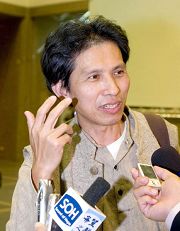Renowned Philosopher Discusses the Outstanding Achievements of Divine Performing Arts (Photo)
(Clearwisdom.net) After watching the last show of the Divine Performing Arts in Taipei, Professor Shih Chao-Ying of the Graduate Institute of Philosophy at Chinese Culture University expressed his wonder at the design of the backdrop, which had gone beyond the traditional static backdrop to incorporate animation. He thought the dancers had a profound spirit and a solid foundation in cultivation, which made their dances refreshing and heart-moving, and presented a higher dimension.
Professor Shih Chao-Ying of the Graduate Institute of Philosophy at Chinese Culture University said the dancers had a profound spirit and solid foundation in cultivation. |
A View of Divine Performing Arts from Aesthetics
Professor Shih received his Ph.D. in Philosophy from Catholic University of Louvain in Belgium. During his seven years of study in Europe, he visited the European countries and studied books of psychology, religion, philosophy, and art. He has taught in Fu Jen Catholic University, National Hsing Hua University and National Taiwan University of Arts.
Dr. Shih has been teaching Art Aesthetics in the Department of Choreography of Chinese Culture University, and is very familiar with cultivation as it relates to dance. He said his department is very well known in Taiwan for its great training, and many famous dancers had graduated from there. However, Dr. Shih said, what the Divine Performing Arts had shown was marvelous! All the dancers' facial expressions and smiles were from the bottom of their hearts and seemed to originate from their profound spirit. Maybe this was because they had a foundation in self-cultivation, which made their dances refreshing, heart-moving, and presented a higher dimension
Dr. Shih had watched many shows in Mainland China, including shows by authentic Mongolian and Manchu performers. "However, the dancers of Divine Performing Arts, though not Tibetan, Dai or Manchu, could dance as well as the people of these nationalities. It was very rare." Dr. Shih thought it was very admirable that the Divine Performing Arts dancers performed even better, because currently, ethnic dancers in Mainland China may not always be able to present the spirit of their nationality.
From Classic to Modern
When asked what he thought about the philosophy of "Creation" and "Splendid Civilization from Heaven" from a philosophical point of view, Dr. Shih said he regarded modern civilization to be in crisis, a world devoid of the sacred. After destroying the sacred, it would pursue changes. However, if there was no spirit behind the changes, the changes would be nothing but a trick. For example, modern painting and modern choreography were this way.
Dr. Shih said it was great that the return to the classics was presented by traditional dances by the Divine Performing Arts. And the return to the classics was not a duplication of the classics, but a modern manifestation of the classics after inheriting the classical spirit.
Dilemma of Modern Art
Dr. Shih said with excitement that he was surprised at the design of the backdrop. It wasn't a traditional static backdrop. It was animated and animated dynamically. The content covered the creation of the world, the prosperity of the Tang Dynasty, Hua Mulan of the Northern and Southern Dynasties, Yuefei of the Southern Song Dynasty, the Manchu Dance of the Qing Dynasty and modern Tiananmen Square. It also accommodated Mongolian Dance, Manchu Dance and Dai Dance. The whole show was a grand and concise history of Chinese culture and dance.
Dr. Shih held that the dilemma of modern art was to create art and dance that belong to the modern age with a classical spirit. The large backdrop of high technology was marveled at by the audience and admired by professional choreographers. It was a successful combination of the modern and the classic.
"From a philosophical point of view, modern art is boring when repeated, but classical can withstand repeated viewing. The more you learn, the deeper you probe into it, the more appeal and meaning you will find."
